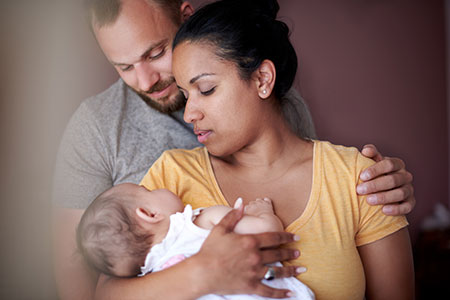Post Adoption Depression Syndrome

by June Bond, Adoption Advocate
You’ve been through infertility and back again. You ran through the maze of the adoption process and you’ve finally reached your goal. You have your baby in your arms. You are finally a member of the “parenthood club”, complete with stroller, burp pads, car seat, and mini van.
The moment they put your baby in your arms, you knew what heaven felt like. As one of my former clients said, “I knew if I died on the way home, I would feel complete.”
Suddenly, three or four weeks later, a strange sense of anxiety comes over you. Some clients describe the feeling as panic. Some say it is a gross feeling of inadequacy for the total responsibility for this little person. Others describe it as a “cloudy blue feeling”, while others go as far as to call it a depression. What I call it is Post Adoption Depression Syndrome (PADS).
The general population recognizes postpartum blues as a natural and expected part of the birth process. Most people identify those feelings of anxiety with “just getting those hormones back into kilter.” But, the truth is that many adoptive parents suffer from the same post placement blues, and feel very confused when they cannot rely on the “hormone theory” to explain their feelings.
There are several other very likely reasons to explain these common feelings shortly after the placement of the baby. Perhaps one of the most reasonable explanations is the completion of one of life’s biggest goals. Parenthood has loomed as an almost unattainable goal for so many adoptive families for such a long time. Reaching that goal has required time, money, effort, emotional strain, and patience.
Suddenly the emotional rush from the attainment of this long desired goal is exhilarating. I sometimes relate the attainment of this goal to the Jewish nation reaching the Promised Land after forty years of struggle. How can anything ever compare in terms of emotional satisfaction with finally being in the land of milk and honey…the land of parenthood? Likewise, how can we possibly maintain that level of emotional high forever?
Think back to the attainment of other life’s goals that you and others around you have reached…completing high school, getting your college degree, marriage, getting a long-desired position, completing a major project… Do you remember the let down after walking across the stage at graduation and returning from your beach trip? Feelings of being “let down” are very common after reaching major life milestones.
Another reason PADS can occur is the unique stresses entailed in the adoption process itself. Many adoptive parents feel that they must once again face, and sometimes resolve, their feelings about infertility upon the placement of their child.
Insensitive questions about your infertility and the reasons that you chose adoption can bring back a whole series of feelings that you thought may have been resolved earlier. Some adoptive families that have a close relationship with the birth mother even seem to suffer some of the grief process with her.
One client mentioned that she could not completely erase the birth mother’s feelings of loss and grief with her own feelings of satisfaction and attainment. “It is almost a bitter sweet victory,” stated one recent adoptive mother.
The adoption process can also bring with it certain legal uncertainties that can easily cause feelings of anxiety and depression. Unresolved birth father issues and rights are one of the most common points of post adoptive stress. Fears about the unexpected costs and newly disclosed health and background information can also trigger stress and fears.
It is important to recognize that adoptive parents also go through many of the same stress points that birth parents go through as new parents. Stress adjustment scales indicate that factors like the addition of a new family member, added financial responsibility, lack of sleep, and increased family responsibilities, all contribute to rising stress levels.
These stresses are often enhanced with adoptive families. The cost of the adoption is usually more than the cost of a birth. Lack of sleep and increased family responsibilities are compounded with the adoptive family by the limited paid maternity leave that many companies allow for the adoption of a child.
Clearly, PADS is a real feeling for many adoptive couples. So, what are some suggestions that can help you, as a new adoptive parent, deal with these feelings?
- Recognize that Post Adoption Depression Syndrome is common and there are several valid reasons for feeling down after your child is placed with you. This does not mean that you have made a bad decision or are different from many other new parents.
- In focusing and sharing birth mother grief, realize that the birth mother made a positive plan for her and her child. You are an integral part of this special plan. If you share in her feelings of loss and grief, then take positive actions to help you both feel good about the plan that has come together for your adoption triad. Write her a letter or make her an album. Make certain that she knows what a great job she has done in giving this precious gift of life to you. Recognize that her grief is a natural part of the healing process.
- Being anxiety ridden about certain legal risks and unresolved/unexpected issues is often a major source of stress. As adoptive parents, we must all accept the fact that with adoption there are certain risks. But, before accepting an adoption situation, make sure that the risks are ones that you can comfortably handle. It is a good plan to keep your head in control when evaluating each potential adoption situation. Once the baby is placed in your arms, the head control is usual replaced by heart control. Ask questions and know in your head the limit that your heart can endure.
- Go to an infant parenting seminar. These seminars are often a part of child birthing classes at most hospitals. Call your local hospital to see when a class is being offered. Some hospitals will even allow a neonatal nurse to work one-on-one with you to show you how to care for your newborn. Added confidence can relieve some of your feelings of anxiety and inadequacy about properly caring for this little, but very demanding, bundle.
- Arrange for time to adjust to your new status. Unfortunately, many companies do not allow adoptive parents to take paid time off. With the rising cost of adoption, many families simply cannot afford to take time away from work without pay. Consequently, one alternative is to rearrange your work schedule, if possible, to be more flexible for the first six to eight weeks. Another suggestion is to make plans for food and other necessities for the initial weeks in advance. One client I knew had a casserole shower from her local dinner club. Fifteen frozen casseroles came in very handy when the new baby arrived. “I wanted to spend every available minute with the baby. Clearly, cooking was a low priority for me.” stated one adoptive mother. Disposable plates, utensils, and cups can also give you more time to relax and adjust.
- Many adoptive couples feel that they must be super-parents. They can pick up a baby from the hospital on Friday, go back to work on Monday, have a meeting on Wednesday night, tend the church nursery on Wednesday night, have gourmet club at their house for the regularly scheduled monthly meeting on Saturday night, never missing a meeting or activity- all on four hours of sleep a night. Realize that birth parents usually take six weeks off from regularly scheduled activities. This time is not just for the healing of the body, but also for adjustment and bonding to the baby. Allow yourself the same time frame to adjust. Take a sabbatical from other responsibilities for six weeks and learn to love your baby.
- Join an adoption support group, if you have not done so already. Share your feelings with others. A former client confided that she did not feel comfortable complaining about the baby’s colic and her lack of sleep. “I felt like people would say that I asked for him…shut up.” Adoptive parents are not super-human. We are real parents, who get tired, irritable, and have REAL feelings. Share your feelings with another adoptive parent in the support group. Bringing your baby home is one of the major highlights in your life. It is the beginning of a long and wonderful journey called parenthood. As with most journeys, there can be detours and bumpy spots in the road. Learning where the pot holes are makes the journey a little bit smoother.

June Bond is a Certified Adoption Investigator who has published numerous articles on adoption in local, state and national publications, and was recognized as South Carolina’s Adoption Advocate of the Year in 1995. She is the mother of six children, four of whom were adopted.
